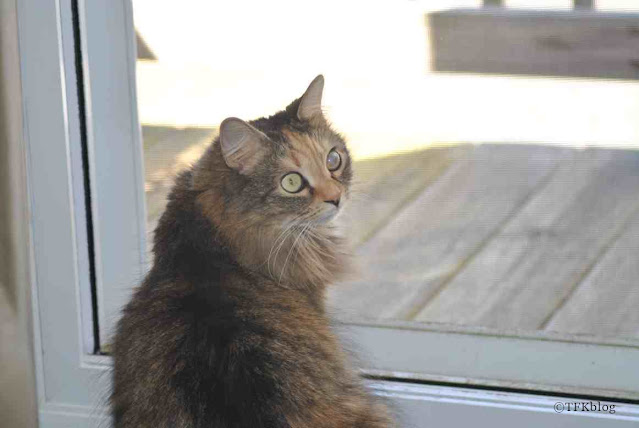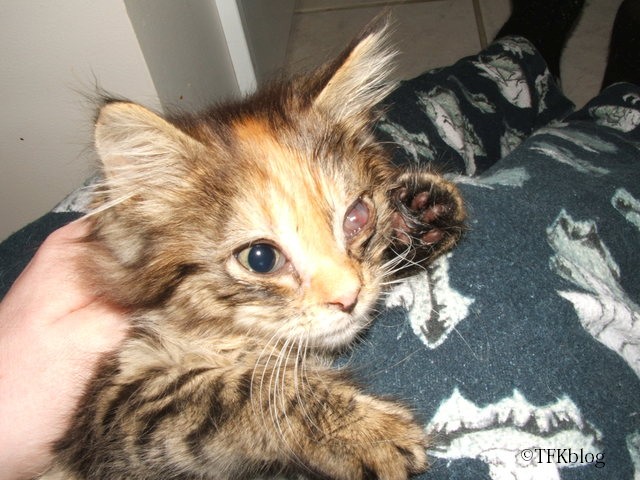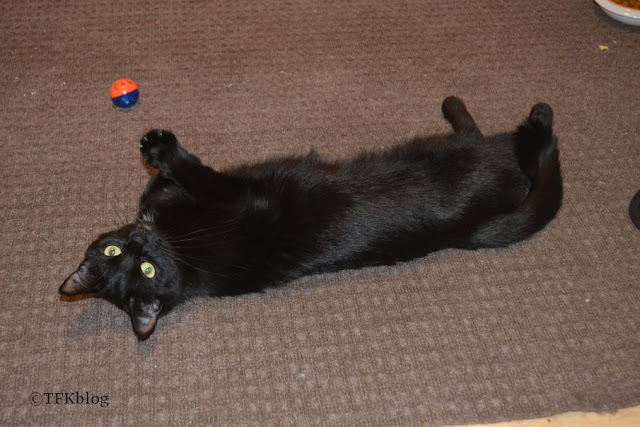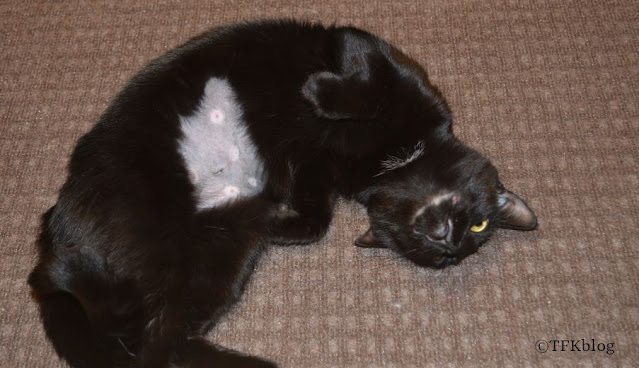 |
|
Having been in rescue as long as I have, and focusing my rescue work on kitties, I have come across FIP too many times. Now that I am also networking and providing support to other people who foster kitties, this topic comes up a lot, and it is quite disheartening to hear so many things that I know are patently untrue when it comes to FIP. I wanted to take a moment to write down what I have learned from my own experiences, by reading as many articles as I have, and being a part of the FIP community.
I will admit, it had been a while since I had dug deep into the research and experiences of owners and vets so to do this post I started looking for verification from the experts of what I knew to be true a few years ago as well as any new data that has arisen. Some of the information has changed dramatically since the availability of the new "treatment" for FIP, and that in and of itself is unsettling. Too many people are calling this once 100% fatal disease "curable", which I find to be misleading.
What is FIP?
FIP is a mutation of the Feline CoronaVirus (FCoV). It is rare, occurring in shelter kitties at a rate of 0.06% of the population (
*) It presents in two ways, wet and dry. Wet fills the abdomen with fluid, dry does not.
What is Feline CoronaVirus (FCoV)?
CoronaVirus in cats generally is pretty harmless(*); it might cause a bit of diarrhea which might need some supportive care such as fluids, but on the whole, there is not much to be done for it but wait it out. Think of it a very mild common cold. FYI: one fact I stumbled on while getting the reference material for this post is something I have wondered for years. FCoV is a pretty fragile virus. Quote: FCoV is a relatively fragile virus (inactivated at room temperature within 24 to 48 hours), but in dry conditions (eg, in carpet), it has been shown to survive for up to 7 weeks outside the cat. Indirect fomite transmission is thus possible, and the virus can be transmitted through clothes, toys, and grooming tools. In organ homogenates, it is even resistant to repeated freezing at −70°C for many months. The virus is destroyed by most household disinfectants and detergents, however. (*)
Unfortunately, the rates of incidents of FCoV is actually very high in shelter and rescue kitties (*), which leads to all kinds of confusion. If you ever hear of feline coronavirus and you look it up on the internet, all you basically find is information about FIP. At least that is what happened to me when I first tried to figure it out. FCoV is actually pretty contagious and I have been told that we should just assume that any shelter/rescue kitty has it.
FCoV mutates into Feline Infectious Peritonitis (FIP)
Occasionally, rarely, FCoV mutates into Feline Infectious Peritonitis. As far as I can tell, we still do not know why(
*). There is a really
cool video on YouTube that shows what happens after the mutation if you are interested.
Once the virus mutates, it is no longer contagious. If you have a kitty with FIP, you do not need to be afraid of it giving it to another kitty. Could the second kitty also mutate the coronavirus and acquire FIP, yes, especially if they have similar genetics and similar stressors in their life, but remember, this is a pretty rare occurrence in the first place.
I have been hearing some people talk about Ocular and Neurologic FIP. I found this quite fascinating as I have only ever heard the experts talk about "wet" and "dry" forms of FIP. Looking for information on this I have found that people are using these terms to discuss the progression of dry FIP. Back in 2002, my cat Kodi (
*) had dry FIP (although we never did the necessary tests to ultimately confirm that) and he started bleeding in his eyes at the end. It was what caused me to realize that his time was at an end. I always assumed that it was due to the damage of his internal organs and not FIP in his eye, but in the end, that is unimportant. What matters is figuring out if when someone suggests your kitty has FIP if that is accurate or not.
Why am I writing this post?
The reasons are two-fold. One to discuss what FIP is and the second is the serious limitations we still have regarding this disease. We still have no definitive way to diagnosis it. There is no FIP test despite what vets will tell you. Researchers are getting closer to figuring out how to definitively say a cat has it, but right now that is only via some very expensive testing and even that is only 96% accurate. There are biomarkers that can "rule in" or "rule out" FIP, but that does not mean the cat actually has it as those biomarkers can be raised for any number of other reasons.
There are many symptoms to FIP depending on how it presents and sadly all of them are generic and can present because of any number of diseases. Some issues that have been misdiagnosed as FIP have been: toxoplasmosis, brain tumor, required a dental, lymphoma, bacterial pleurisy, thiamine deficiency, cancer, worms, cerebellar hypoplasia among others. Most of these have a pretty safe and easy treatment, so when your health care provider is suggesting your kitty has FIP then you really need to either tell them to forget that diagnosis and look for something else or get yourself to a new vet. The experts in the field have a
flowchart to diagnose it. I am going to reiterate how rare it is. Only 18% of the samples for testing that had a diagnosis of FIP actually had FIP. Quote:
"You can only be really confident of an FIP diagnosis if you have a positive FCoV RT-PCR result on the effusion of a wet FIP case, or a MLN FNA or aqueous humour in a non-effusive FIP case." (*)
These cases are not just people thinking the kitty had FIP, but vets who suspected it enough to refer the case on to this point.
Are you starting to understand why I get so incredibly frustrated when people bandy about the idea that a kitty is suffering from FIP? Yes, FIP is a real and incredibly serious disease. FIP can and does happen to kitties everywhere, but simply because a kitten is failing to thrive doesn't mean it has FIP.
FIP is also a disease that takes time. Kittens are generally not diagnosable before three months. They are only open to infection to FCoV at 5 to 7 weeks when their maternal antibodies start to wean. It then takes time for the body to interact with the virus enough to mutate and then it takes another couple of weeks for the mutation to do the damage required to start showing symptoms. (
*) Most cases of FIP occur in cats between 4 and 18 months (
*)
But isn't FIP treatable now?
Yes, there are two drugs that have put cats with FIP into remission. Some people call that a cure, but with so little data on the subject it is hard to know. I looked into what it would take to get the drug, and it is basically a black market drug from China that requires almost no oversight. You don't need a diagnosis of FIP (mostly because it is still extremely hard to prove as there is no test for it) and the people selling this drug simply say if you suspect it to go ahead and try it and see what happens. From what I have learned it is extremely expensive (in the thousands of dollars range) and quite painful (the medication stings) and it involves daily injections for weeks if not months and sadly many cats do not survive. Because we generally do not know if the cats who receive this treatment actually have FIP or not, we can not say that those who survive the treatment are cured of FIP. Maybe they had some other condition that they recovered from because of the constant care of the owner while being given this medication. Lastly, since this medication has only been in use a few years (at the time of this post) we have no long term data about what happens to these cats in five or ten years. Do they continue on with a normal life? Is there organ damage? Are cancer rates higher (or lower?)? We simply do not know. I do know that, at this time, if I had a kitten with a seriously strong suspicion of FIP, I believe I would not give the medication at this time.
In conclusion:
While FIP is a real and serious threat to kitties and it is not something to be taken lightly. If you suspect your kitty has FIP, you really need to work with a vet who is willing to ignore the suspected FIP infection and look for a different diagnosis or work with you to do the necessary tests (
*) to figure out if that is what you are dealing with. If your vet is not willing to go the extra mile for a kitty who they suspect has FIP, you need a new vet.
I have said that more kittens die of a false FIP diagnosis than will ever die of the disease itself, and the experts are in agreement.










